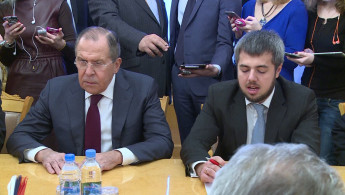Russia says Syria talks postponed, UN won't confirm
The United Nations cannot confirm a Russian statement that talks on the Syrian conflict planned for 8 February in Geneva have been postponed, a spokesperson for UN special envoy Staffan de Mistura said on Friday.
"There is no confirmation that the February talks are postponed," said Yara Sharif.
"We're going to be sure when the special envoy is back" from talks next week with UN Secretary General Antonio Guterres.
Russian Foreign Minister Sergei Lavrov said earlier on Friday that the Geneva talks would be postponed until the end of February.
"The date of February 8 has been put back until the end of next month," Lavrov told a meeting with minor Syrian opposition representatives in Moscow to discuss peace talks in Kazakhstan that ended on Tuesday without a major breakthrough.
He did not elaborate on the reasons for the postponement.
The main opposition groups stayed away from the Moscow meeting with Lavrov, as the Kremlin seeks to impose its influence as the key powerbroker in Syria on the back of its game-changing military support for leader Bashar al-Assad.
 |
| 'Russia's bottlehold on Syria' |
Representatives from armed opposition groups and Damascus were expected to hold their first face-to-face talks in Astana, but the rebels refused over regime truce violations and mediators were forced to shuttle between the two sides.
Key players Russia, Turkey and Iran backed the talks and the main result was an agreement by the three sides to try to shore up a shaky ceasefire on the ground in the war-torn country.
Russia has also proposed a draft of a new Syrian constitution that would grant Kurds greater administrative freedoms within a more decentralised government.
Lavrov said the proposed draft came in a bid to encourage debate - not an attempt to enforce Moscow's will on the Syrians.
Coming up with a new constitution for post-conflict Syria is seen as a major hurdle for any talks to end the bloodshed that has cost more than 310,000 lives since protests against Assad erupted into conflict in 2011.
Russia and the United States had pushed for the two sides to come up with a new constitution for the war-torn country by August 2016 during previous unsuccessful talks.
A constitution adopted in 2012 left President Bashar al-Assad with sweeping powers, including the right to name the premier and government and, in some cases, veto legislation.





 Follow the Middle East's top stories in English at The New Arab on Google News
Follow the Middle East's top stories in English at The New Arab on Google News
![The UAE is widely suspected of arming the RSF militia [Getty]](/sites/default/files/styles/image_330x185/public/2024-11/GettyImages-472529908.jpg?h=69f2b9d0&itok=Yauw3YTG)
![Netanyahu furiously denounced the ICC [Getty]](/sites/default/files/styles/image_330x185/public/2024-11/GettyImages-2169352575.jpg?h=199d8c1f&itok=-vRiruf5)
![Both Hamas and the Palestinian Authority welcomed the ICC arrest warrants [Getty]](/sites/default/files/styles/image_330x185/public/2024-11/GettyImages-2178351173.jpg?h=199d8c1f&itok=TV858iVg)